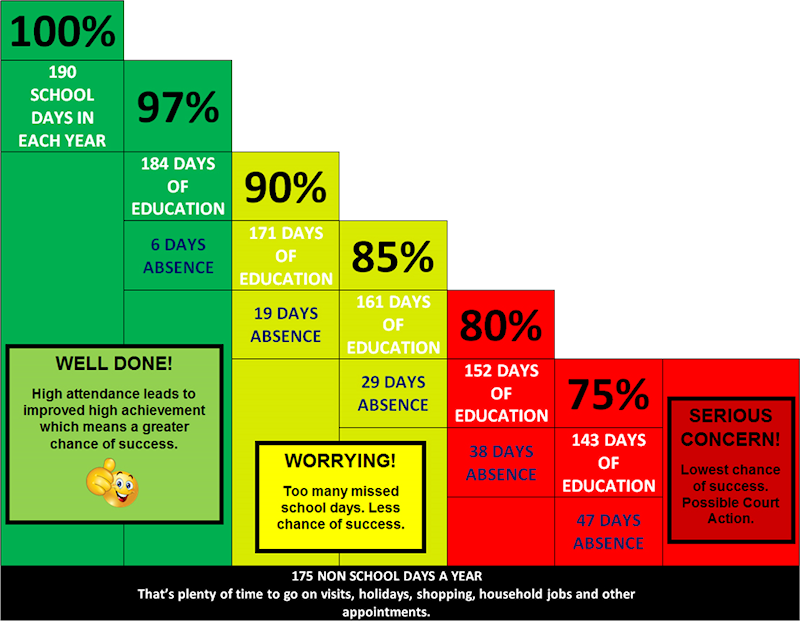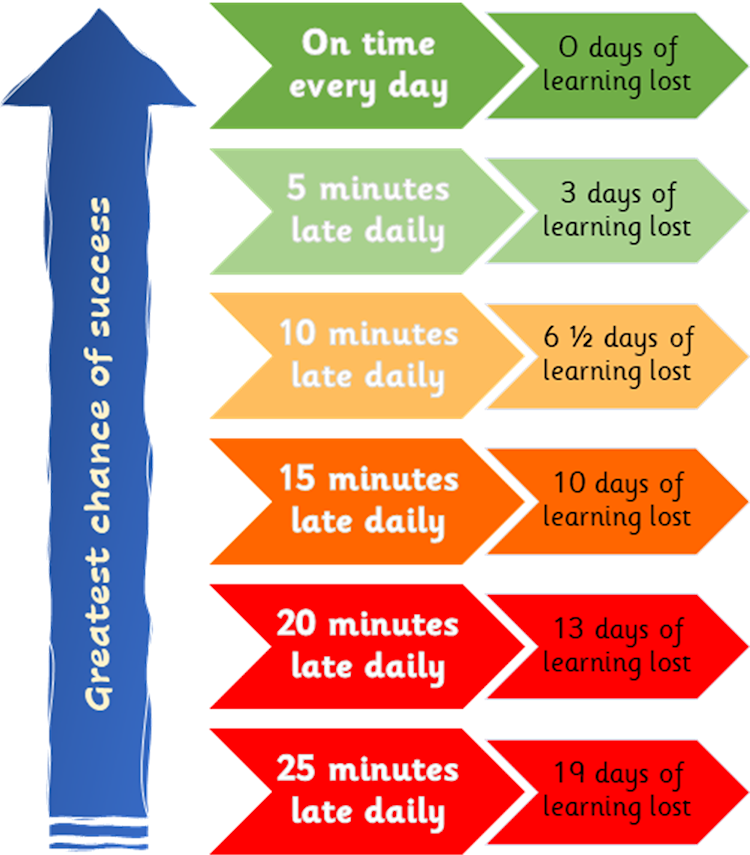Attendance
It is important that your child gets to school on time and aims for 100% attendance!
For the majority of the time, most pupils have good attendance and we thank parents for their ongoing support in ensuring that this continues. Sometimes however, attendance of some pupils falls below the minimum expected 95%.
St. Jude’s Catholic Primary School is working in partnership with parents, the Local Authority and CSAWs Central School Attendance and Welfare Service to improve school attendance.
Ms Harris is our CSAWS attendance officer and Mrs Smith is our Attendance Champion.
Read more: BCC: Good Attendance Matters
The Education Regulations 1991 (Pupils’ Attendance Records)
The regulations (see below) require the school to keep very detailed records concerning pupils’ attendance and to publish data.
We are pleased with our pupils’ attitude towards school attendance and we are sure you will assist the school in maintaining this positive approach. The regulations are more concerned with non-attendance than attendance, and non-attendance falls into two categories: authorised and unauthorised.
Read more:
- Gov.uk: The Education Regulations
- Birmingham CC: School Attendance, Advice for Parents
- Our Attendance Policy on our Policies page
Authorised Absence
Authorised absence is absence for a valid reason. This includes circumstances for which leave has been granted such as sickness, medical and dental appointments, educational visits or death in the immediate family. This list is not definitive and there may be other events which fall into this category.
This list is not intended to promote authorised absence as we would expect medical and dental appointments to be arranged outside the school day.
A copy of any appointment letter or card should be sent to school. A note is required if a child is to leave school during the day for any reason, e.g. medical or dental appointments. All children must, on these occasions, be collected from the school building. Please report to the Office.
Please note, current policies do not allow holidays during the time school is in session. If you do need to request some time out of school for your child, please write to the Headteacher requesting leave of absence. In the majority of cases, such leave will not be granted.
What to do if your child is absent from school
Please phone on the first day of absence leaving your child’s name, class and reason for absence. This needs to be done every day that your child is absent from school. These messages may be left on the school’s answer phone, or delivered in person.
If we have not heard from a parent by 9.30am the reason why their child is absent from school, we will ring all of the contact numbers registered for that child until contact is made.
Unauthorised Absence
Unauthorised absence is unjustified absence. This is absence as a result of premeditated or spontaneous action on the part of the pupil, parent or both. Schools are required to keep attendance registers which record the nature of absence.
Penalty Fines
If you take your child out of school without the prior approval of the school, you may be liable for a penalty fine.
From September 2024, a penalty fine is £160 per parent, per child (if paid within 28 days). This is reduced to £80 per parent, per child (if paid within 21 days).
Therefore, the cost for:
- 2 children = £160 x 2 parents = £320
- 3 children = £240 x 2 parents = £480
Second offence: there is no reduction in the penalty fee.
Third or further offences: the case may be proceeded straight to prosecution under the Single Justice Procedure – magistrates can impose a fine of up to £1,000.
These regulations are not set by school and we don’t gain anything financially from fining parents. We do, however, follow procedure correctly and we urge all parents to take note of the guidance.
Rewards and Impact
Attendance Rewards
We do like to recognise good and improved attendance at St. Jude’s. A number of rewards are in place for children at school. This could be verbal praise and acknowledgement for a pupil whose attendance has improved over a period of time. There are also reward certificates and other treats for children who have good and improved attendance.
Lost Learning and Why Good Attendance is Essential
Every single day a child is absent from school equates to a day of lost learning. Attendance percentages can be misleading. For some parents 90% may seem like an acceptable level of attendance, but the reality is that 90% attendance means that your child will miss half a day of school each week or nineteen days of school during the school year – that’s nearly four school weeks. This level of absence can have a lasting impact on their chances of academic success and on their emotional well-being.
When a child’s attendance hits 90%, this is classed as persistent absence and it could be the start of a legal process called Fast Track. Government guidelines insist that where a pupil is deemed to be a persistent absentee, Fast Track procedures are followed. This could lead to Court Action and a fine.

What happens if we are worried about your child’s attendance
Good attendance is 95% or more, if attendance is below 90% the child is classified as ‘persistently absent’ from school and this will have a negative impact on the child learning.
If we have concerns about your child’s attendance, we will contact you so that we can offer support and work together to make sure your child’s attendance is good. We have an excellent Pastoral Manager who will also work with families if there is concern about school attendance.
We do follow Local Authority guidelines when it comes to attendance and punctuality using a process called Fastrack. A letter is sent out at least annually to all families to remind them of the importance of good attendance. We expect every family to support us in this. When attendance drops below the acceptable percentage of 95% for a pupil, parents will receive a letter to highlight this concern. An improvement is then expected. If this is not achieved, guidelines expect us to take further action which could ultimately result in a fine.
Punctuality and Lateness
Having good attendance also means being on time and not being late to school. Children who arrive late can feel embarrassed, left out and miss out on important introductions to lessons.
Punctuality is an essential life skill that needs to be taught from the very beginning.
Doors open at 8.45 am for children to go into their classrooms. This time allows pupils to organise themselves for the day ahead and complete early morning tasks which re-enforce their learning. Registers are taken and 8.55 am ready for lessons to begin. If your child arrives after the gates are locked, then they will receive a late mark. If a child is persistently late and there is no improvement made, then the matter will be referred to the Educational Welfare Officer.
If you are late, an adult is expected to come to the school main entrance and sign their child in giving a reason for their lateness.

Impact of Lateness
Lateness impacts on both the child and the class:
Child
- Misses first part of a lesson.
- Disrupts other children.
- Feels vulnerable and different by arriving late in class.
- Can perform marginally worse than peers academically.
- Misses important morning announcements.
Class
- Teacher having to repeat instructions.
- Disrupted when child walks in.
- Attainment is effected by lateness.
- Late marks can effect the class attendance figures if the child is late after the register closes..
Remember: Being 15 minutes late each day is the same as missing two weeks of school!

